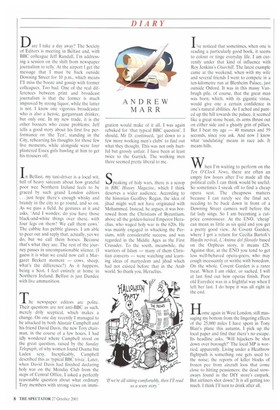DIARY ANDREW MARR
Dare I take a day away? The Society of Editors is meeting in Belfast and, with BBC colleague Jeff Randall, I'm addressing a session on the shift from newspaper journalism to telly. At the airport I get the message that I must be back outside Downing Street for 10 p.m., which means I'll miss the booze and gossip with former colleagues. Too bad. One of the real differences between print and broadcast journalism is that the former is much improved by strong liquor, while the latter is not. I know one vigorous broadcaster who is also a heroic, gargantuan drinker, but only one. In my new trade, it is the other boozers who cause problems: Jeff tells a good story about his first live performance on 'the Ten', standing in the City, rehearsing his thoughts for those few live moments, while alongside were four plastered Essex girls bawling at him to get his trousers off.
In Belfast, my taxi-driver is a local wit, full of heavy sarcasm about how grateful poor wee Northern Ireland feels to be graced by such grand London editors . .. just hope there's enough whisky and brandy in the city to go round, and so on. As we pass a field, he gestures at it and asks, 'And I wonder, do you have those black-and-white things over there, with four legs on them? We call them cows.' The cabbie has pebble glasses. I am able to peer out and reply that, actually, yes we do, but we call them horses. Because that's what they are. The rest of the journey passes in uncompanionable silence. (I guess it is what we could now call a Margaret Beckett moment — cows, sheep, what's the difference?) As it happens, being a Scot, I feel entirely at home in Northern Ireland. Belfast is just Dundee with live ammunition.
The newspaper editors are polite. Their questions are not anti-BBC as such, merely drily sceptical, which makes a change. On one day recently I managed to be attacked by both Alastair Campbell and his friend David Davis, the new Tory chairman, in the course of a few hours. I had idly wondered where Campbell stood on the great question, raised by the Sunday Telegraph, of why women found Osama bin Laden sexy. Inexplicably. Campbell described this as 'typical BBC trivia'. Later. when David Davis had finished declaring holy war on the Monday Club from the steps of Central Office, I asked a perfectly reasonable question about what ordinary Tory members with strong views on immi
gration would make of it all. I was again rebuked for 'that typical BBC question'. I should, Mr D. continued, 'get down to a few more working men's clubs' to find out what they thought. This was not only hurtful but grossly unfair. I have been at least twice to the Garrick. The working men there seemed pretty liberal to me.
Speaking of holy wars, there is a scoop in BBC History Magazine, which I think deserves a wider audience. According to the historian Geoffrey Regan, the idea of jihad might well not have originated with Mohammed. Instead, he argues, it was borrowed from the Christians of Byzantium, above all the golden-haired Emperor Heraclius. who waged holy war in the 620s. He was mainly engaged in whacking the Persians, with considerable success, and was regarded in the Middle Ages as the First Crusader. To the south, meanwhile, the warriors of Islam — many of them Christian converts — were watching and learning ideas of martyrdom and jihad which had not existed before that in the Arab world. So thank you. Heraclius. I've noticed that sometimes, when one is reading a particularly good book, it seems to colour or tinge everyday life. I am currently under that kind of influence with Roy Jenkins's Churchill. The latest example came at the weekend, when with my wife and several friends I went to compete in a ten-kilometre run at Blenheim Palace, just outside Oxford. It was in this massy Vanbrugh pile. of course, that the great man was born; which, with its gigantic vistas, would give one a certain confidence in one's natural abilities. As I ached and panted up the hill towards the palace, it seemed like a great stone beast, its arms thrust out on either side and a ghastly grin of pillars. But I beat my age — 40 minutes and 59 seconds, since you ask. And now I know what 'undulating' means in race ads. It means hills.
When I'm waiting to perform on the Ten O'Clock News, there are often an empty few hours after I've made all the political calls I can think would be useful. So sometimes I sneak off to find a cheap opera seat. The cheapness matters because I can rarely see the final act, needing to be back down in front of a Downing Street camera well before the fat lady sings. So I am becoming a cutprice connoisseur. At the ENO, 'cheap' can mean as little as six quid and you get a pretty good view. At Covent Garden, where I got a return for Cecilia Bartoli',, Haydn revival, L'Anima del filosofo based on the Orpheus story, it means £28. Against that, at the ENO you tend to get less well-behaved opera-goers, who may cough incessantly or writhe with boredom. On the whole, Covent Garden is a rarer treat. When I am older, or sacked, I will at last find out how operas finish. Poor old Eurydice was in a frightful way when I left her last. I do hope it was all right in the end.










































































 Previous page
Previous page